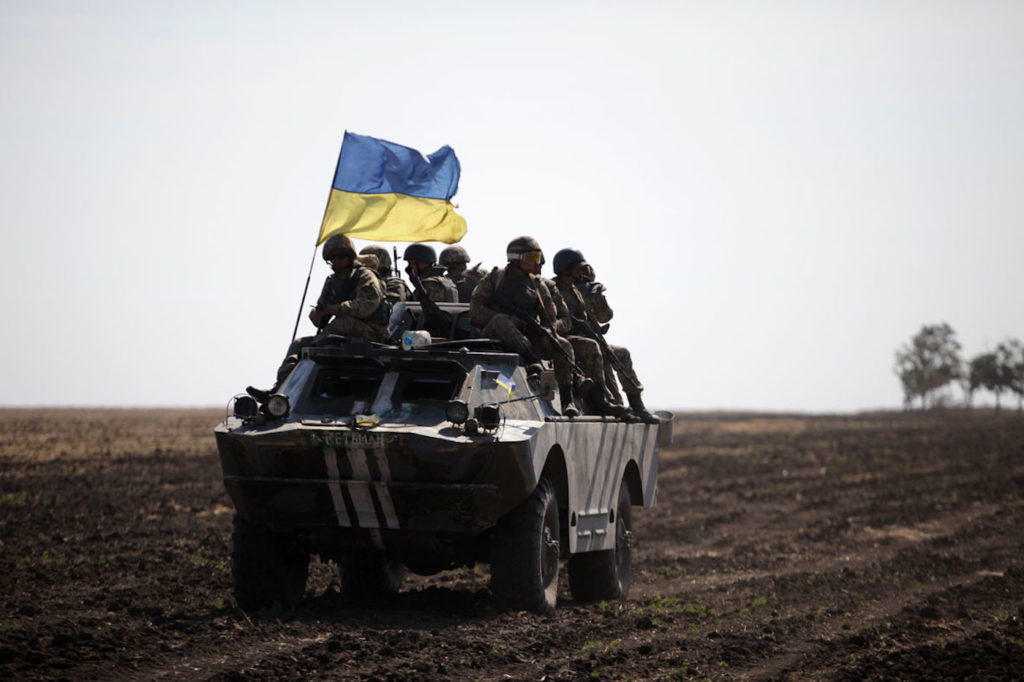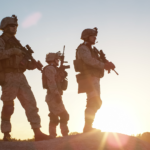Since Russia’s invasion of Ukraine last month, many commentators, academics, and reporters have analyzed the conflict using just war theory criteria. Most writing about the war from this angle agree that Russia’s invasion is unequivocally wrong, but there is a wide range of views about whether Ukraine’s response to the invasion is just. There are also disputes about how NATO and other nations should or shouldn’t be involved according to just war theory.
A proper reading of the just war theory’s criteria, I think, clearly shows that Ukraine’s defensive war against Russia is just. The just war tradition’s criteria are all met by Ukraine’s decision to engage in combat. The ongoing conflict is the result of an unprovoked and unjustified war of Russian aggression on Ukraine. Consequently, Ukrainian armed forces and citizens have the right, and even the duty, to defend themselves in order to maintain their political independence and territorial integrity.
Of course, the question whether interventions from other nations and international bodies would be just is a more complicated matter. Some kinds of interventions are just but others aren’t, depending on the kind of involvement under consideration.
I will first consider key just war teachings in light of the Russian-Ukrainian war to show why Russia’s invasion completely fails to meet any just war standards and how Ukraine’s self-defense does meet these standards. Then I will examine certain actions other nations are discussing or considering in light of just war theory.
Start your day with Public Discourse
Sign up and get our daily essays sent straight to your inbox.Just War Criteria
The just war tradition is not a series of principles that judge a particular war (e.g., the current war in Ukraine) as just or unjust. Rather, it provides criteria to evaluate whether an individual nation’s decision to engage in combat is just or not. Hence, one side (e.g., today’s Russia) may be engaged in clearly unjust military actions—both in the reasons for which they went to war and in the ways they conduct their attacks—while the opposite party (Ukraine) may be fighting a just war.
In the current war between Russia and Ukraine, there is a clear difference between the two sides, and the criteria of the just war tradition lean heavily in favor of the latter. The three main criteria for a just war are a just cause, proper authority, and right intention. Ukraine’s defensive military actions fulfill all three.
The causes for which the two sides are fighting are diametrically opposite: Russia wants to destroy, annex, or in some way dominate Ukraine, while Ukraine wants to prevent that from happening. Ukraine has been a victim of Russia’s aggression since 2014 when Russia illegally annexed Crimea. Russia also materially supported parts of the Luhansk and Donetsk regions’ separation from Ukraine.
Ukraine’s political sovereignty and diplomatic independence are only a “threat” to Russia’s vision of imperialism over Slavic lands. This is akin to the threat that a locked door poses to a thief.
Russia’s full-fledged invasion of Ukraine on four fronts demonstrates beyond a doubt that Russian intentions are to devastate the Ukrainian state and turn it into an appendage of Moscow. The justifications brought by Putin are spurious: Ukraine presented no threat to Russia. Even in the highly unlikely case that it had been allowed to join NATO, Kyiv would not have had the military capability, the political will, or the allied support to attack Russia. Furthermore, NATO is a defensive alliance, not an offensive team to support individual leaders’ unrealistic ambitions. Ukraine’s political sovereignty and diplomatic independence are only a “threat” to Russia’s vision of imperialism over Slavic lands. This is akin to the threat that a locked door poses to a thief. The just cause is on Ukraine’s side.
Interestingly, religious authorities in Ukraine and Russia have echoed their respective countries’ views about the justice of the war. Both the Orthodox and Greek Catholic religious leaders of Ukraine have stated repeatedly and clearly that Ukrainians have the right to self-defense and even that it is their patriotic duty to protect their families, land, and political independence. For instance, His Beatitude Sviatoslav Shevchuk, the Ukrainian Catholic Archbishop of Kyiv, said on March 6 that “our soldiers, the girls and boys, . . . truly with their bodies shield the peaceful population, professionally and with their complete conscience fulfill the difficult duty of defending their homeland.” The Ukrainian Orthodox Church, which since 2019 is autocephalous—that is, independent of the Russian Orthodox Church—has also supported Ukrainian citizens fighting in defense of their country.
This stance is in stark contrast to the position of the Moscow Patriarch Kirill, who has repeatedly advocated the unity of a Russkiy Mir, a region uniting Russian speakers (in Russia, Belarus, and Ukraine) under Moscow’s rule. Last week, he justified Putin’s war as a defense of Russians within Ukraine from alleged extermination. Even more worryingly, the Russian Orthodox Church supports Russian nuclear weapons as the indispensable tools for the protection of this wider “Russian world.” While Ukrainian church leaders’ stance aligns fully with just war theory, their Russian counterparts are at the service of Putin’s imperial ambitions, justifying a war of aggression and even a potential use of nuclear weapons.
The proper authorities of Kyiv, which is the second criterion of a just war, are waging the war. President Volodymyr Zelensky is an unlikely hero here. A TV comedian, with some dubious views on social issues and perhaps less than saintly personal financial behavior, Zelensky stood up to enormous political pressure before the February 24 attack. Now that the shooting has started, he continues to shore up the morale of his citizens under the relentless onslaught of Russian forces. He was duly elected and is the rightful political authority.
The third criterion for just war is right intent. Kyiv has very well defined objectives: the preservation of its territorial integrity and its political independence. It does not want to conquer Russian territories or to change the political regime in Moscow. Ukraine’s intent is to restore peace and the status quo ante. On the other side, Russia’s aims remain murky and are likely to change with the fluctuations in success of its military operations: as its military convoys slow down, Russia becomes more likely to focus on destroying Ukrainian cities. Russia seeks destruction, not peace.
There are a few additional criteria in the just war tradition that apply to this conflict. First, is war the last resort? And is there a reasonable chance of success? From Ukraine’s point of view, a defensive war was clearly the last resort. Kyiv did not initiate the attack and, in fact, might even be blamed for not having adequately prepared for it. The volume of arms supplied by Western countries before the war was, of course, outside of Kyiv’s control. But an earlier and wider popular mobilization could perhaps have had a moderate deterrent effect.
In any event, some pundits have suggested that Ukraine should have acquiesced to some Russian demands, such as accepting a neutral status and halting its efforts to be included in the Western political and economic structures. These arguments suggest that Ukraine could have avoided the Russian offensive. But it is far from certain that Putin would have been satisfied with a neutral and sovereign Ukraine. Moreover, Ukraine’s rejection of Russian demands was not a rejection of negotiated settlement and therefore in no way a provocation. In other words, Kyiv was not seeking war by simply trying to preserve its autonomy of decision and its political sovereignty. Kyiv wanted to preserve its independence and was attacked for doing that.
Kyiv has very well-defined objectives: the preservation of its territorial integrity and its political independence. It does not want to conquer Russian territories or to change the political regime in Moscow.
Reasonable Chance of Success and Other Factors
Perhaps the most difficult criterion to examine is whether Ukraine’s defensive war has a reasonable chance of success. A war, even if waged in self-defense, should have some possibility of succeeding in order to justify the devastation and the killing inevitably involved in war. A stand of political martyrdom seems like a noble course of action that history books will admiringly recount. But such martyrdom may undermine the justice of a defensive war because it could destroy what it seeks to protect.
Ukrainian leaders, however, appear to have judged correctly that their defensive military operations are not hopeless. Indeed, Ukraine’s relentless attacks on Russian supply lines and precise hits on various Russian forces (all, with perhaps one or two exceptions, on Ukraine’s territory) are achieving unexpectedly positive results: the Russian offensive has slowed down and is certainly not attaining its immediate operational goals. Ukraine’s defensive war is far from being a national last stand or a politically ineffective massacre.
Finally, the conduct of Ukrainian military activities has been so far extremely discriminate, proportional, and benevolent—following all the ius in bello rules. Ukrainian forces are hitting exclusively military targets composed of personnel, weapons, and bases of Russian forces. They appear to be treating the increasingly more numerous Russian POWs with benevolence (though they are publicizing POW faces through photos and videos—a possible violation of Article 13 of the Geneva Convention which, among other things, protects POWs from “public curiosity”). Above all, Ukraine is not attacking a civilian population or civilian targets, unlike Russia’s military, which is doing so on a daily basis and with growing intensity.
Some, including Pope Francis in a confusing footnote (#242) of his encyclical Fratelli Tutti, seem to think that modern warfare, with its advanced weapons system, makes combat operations less likely to be just. Modern conventional weapons are undoubtedly more lethal than the ones used even 70 years ago, but they are also more precise, enabling combatants to more carefully discriminate targets. Russia is not doing that, but Ukraine is. In fact, Ukrainian forces have been armed increasingly with anti-tank weapons and portable surface-to-air missiles that are effective against precise targets.
The biggest difference between past and modern wars is that, today, the decision-making process is often at the lowest level of the military hierarchy: the actual shooter can choose where to point these weapons. In earlier eras, attacks required that decisions be made at a much higher level (e.g., to organize an artillery barrage or a strategic bombing campaign). Hence, especially today, the conduct of a just war requires well-trained armed forces, capable of making difficult decisions at the “tip of the spear,” in the heat of combat. So far, Ukrainians have demonstrated they have the necessary training and individual discipline to wage a just war.
In brief, the use of force by Ukrainian authorities is squarely within criteria of a just war.
Just War and Foreign Intervention
The question, then, is whether other states have the obligation to aid a state, such as Ukraine, that is fighting a just war. I think there is more room for disagreement here. Providing humanitarian aid to Ukraine or to the 1.7 million Ukrainian refugees is certainly justified and even morally obligatory, despite a possible backlash from Russia. Poland has already taken more than a million refugees, and a recent public opinion poll indicated that 90 percent of Poles support continued admission of Ukrainians. There are of course costs and risks that come with generously opening a country to war refugees, and every political leader will have to make his or her own calculation. But it would be difficult to criticize this kind of support as unacceptable.
Arming Ukraine, something that most Western countries at this point are doing openly, is also permissible, and perhaps to be encouraged, especially because Ukrainian forces are conducting themselves in a restrained way. Indeed, Ukraine’s need for foreign weapons perhaps reinforces its proportionate and precise military conduct. It knows that acting otherwise would be likely to result in the cessation of the flow of Western arms.
The question, then, is whether other states have the obligation to aid a state, such as Ukraine, that is fighting a just war. I think there is more room for disagreement here.
However, there are serious prudential questions to consider for other countries in deciding whether and how they should intervene militarily on Ukraine’s side. For instance, many, including President Zelensky, have raised the possibility of extending a “no fly zone” (NFZ) over Ukraine. An NFZ would prevent Russian planes and helicopters from flying over the theater of operations. But to establish such an NFZ would require an active involvement of Western air forces, which most likely would have to shoot down Russian planes and helicopters as well as target Russian radar and surface-to-air installations. This would lead to a rapid escalation and widening of the war, causing more devastation and bringing the conflict to a threshold that is too uncomfortably close to a nuclear war between Russia and NATO. Consequently, the risk of a direct clash between Russian and Western (most likely NATO-allied) forces is too great to justify the potential benefits that an NFZ—or even the temporary protection of a humanitarian land corridor—may bring to the Ukrainian population.
There is nothing in mankind’s history to indicate that we are progressing into an age in which war is an anomaly. Nor has war become merely clashes among unenlightened, morally equivalent actors who have failed to advance with the rest of the world. War will remain a persistent feature of international politics, and waging war is and will be in many cases a necessary evil. Ukraine’s self-defense is exactly that.














